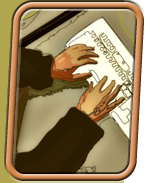|
|
||||||
|
|
|
|
||||
|
|
|
|
|
|
||
|
|
||||||
|
|
|
|
||||
|
|
|
|
||||
|
|
|
 |
|
|
|
|
|
|
|
|
|
|
|
|
|
|
|
|
|
|
|
|
|
|
|
|
|
How Can We Halt the Spam Onslaught? The Baltimore Sun I received a very nice invitation the other day to play poker with Wendy O'Brien. I enjoy poker and briefly considered the offer, as I hadn't played in a long time. But there was one small problem: I have no idea who is Wendy O'Brien. My invitation from Ms. O'Brien appeared in my e-mail box, along with 21 other pieces of spam, or electronic junk mail. Let me, for posterity, note others I received that day: The address "Inquiries" told me I qualified for a diploma. MaryJo sent me an "expiration notice." Sound familiar? It should. Spam, also sometimes called unsolicited commercial e-mail (UCE), is a growing problem for many e-mail users. One could call it an annoyance, but getting 84 pieces of junk mail in one 24-hour period? That's no nuisance. That's harassment. And it should stop. But how? Options range from self-protection to redoubling corporate efforts to a federal anti-spam law. I am inclined toward a heavy dose of No. 2 and am wary of No. 3. More on those later. First, No. 1. In my experience, protecting oneself is only half a solution. Hotmail, my provider, offers varying degrees of filtering. But by setting my filter on "high," I still got over 10 UCEs per day -- and that was just in my in-box, not my junk mail folder. That got more like 20 per day. So I switched to the "exclusive" option. And now? I'm standing firmly back on square one: I've got to scroll through my junk mail folder to retrieve any wanted e-mails the filter may have identified as spam. Predictably, the do-it-yourself remedy fails to satisfy everyone, especially since spam can be fraudulent. Numerous states require honest labeling and an "unsubscribe" (take me off your list) mechanism. Besieged providers such as America Online have won civil judgments against cyber outlaws. Last year, a criminal case resulted in a probation sentence for a Californian who had been clogging a server with thousands of home-mortgage UCEs. That much legalism is well and good. But groups such as the Coalition Against Unsolicited Commercial Email argue that only a federal law will do the trick. Junk fax legislation -- allowing individuals to sue and collect $500 per unauthorized commercial fax -- is an oft-mentioned model. But the war on terrorism put spam on the congressional back-burner. Which isn't a bad thing. Because not all e-mail ads are bogus, and it would be a mistake to constrain the Internet's legitimate marketing potential. The problem is separating the wanted from the unwanted. And it's Internet providers, not the federal government, that are best equipped to do that. CNET, an online technology news service, reports that ever-"smarter" mail applications able to recognize and kill spam are one tool being worked on. "Block lists" run by groups such as Spamhaus enhance filtering for Internet providers. Maybe it's just me, but I can't see ideas like these coming from any senator. Consumers can also help further stigmatize the bad guys by supporting bona fide Internet marketers. We must do that by "opting in" to information about products we want. Let's say I'm shopping for a mortgage: I visit a bank Web site and sign up for free information. That way the right person -- me -- is in control of what I get. Or say you want some product information but don't always want to search for it or opt in. Perhaps one could choose, through a provider, ads one wants to receive. Suppose I open a new account with Earthlink and tell it I want travel or cell-phone pitches. Presto! In come the e-mails. Earthlink blocks all other content. No such option now exists on Earthlink, or on AOL or Hotmail. A block list could be employed here. How hard would it be for an Internet watchdog group to identify responsible marketers, and then work with providers to even better shun those "Erase Debt!" scams? Finally, it's possible that spammers will get the message that they're just not wanted. Most people are fed up with spam. How many people will buy "great insurance" from Leo Desai if they don't know and trust him? I certainly don't know or trust him, but he still visits my mailbox. If we ignore the likes of Mr. Desai, might he go away? Hopefully. Whether we have the patience is another matter. In any case, something's got to give. Because, really, I'd prefer to play poker with people I know.
|